Understanding the World of Tourism: Development and Impacts Essay
VerifiedAdded on 2023/06/17
|9
|2234
|435
Essay
AI Summary
This essay examines the evolution and development of contemporary tourism, focusing on its economic, environmental, and socio-cultural impacts. It identifies factors such as terrorism, epidemics, and travel costs that influence tourism trends. The essay discusses both positive and negative economic impacts, including foreign exchange earnings and increased pricing. Environmental impacts cover improved management versus resource depletion and infrastructure costs. Socio-cultural impacts include the promotion of social events and peace, alongside ethical issues and erosion of local languages. The conclusion emphasizes tourism's role as a productive activity and the need for sustainable practices to mitigate negative effects. Desklib offers similar resources for students.
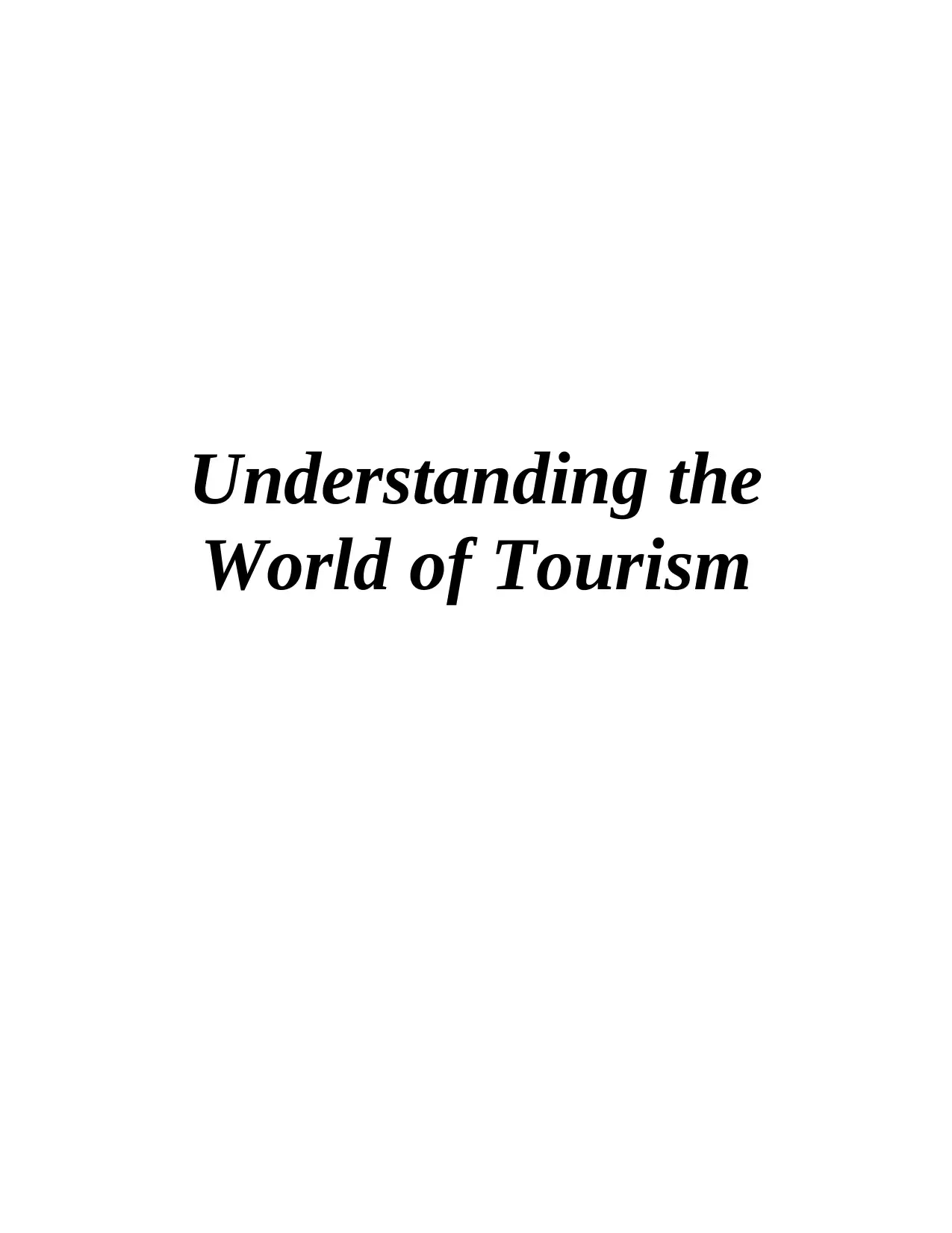
Understanding the
World of Tourism
World of Tourism
Paraphrase This Document
Need a fresh take? Get an instant paraphrase of this document with our AI Paraphraser
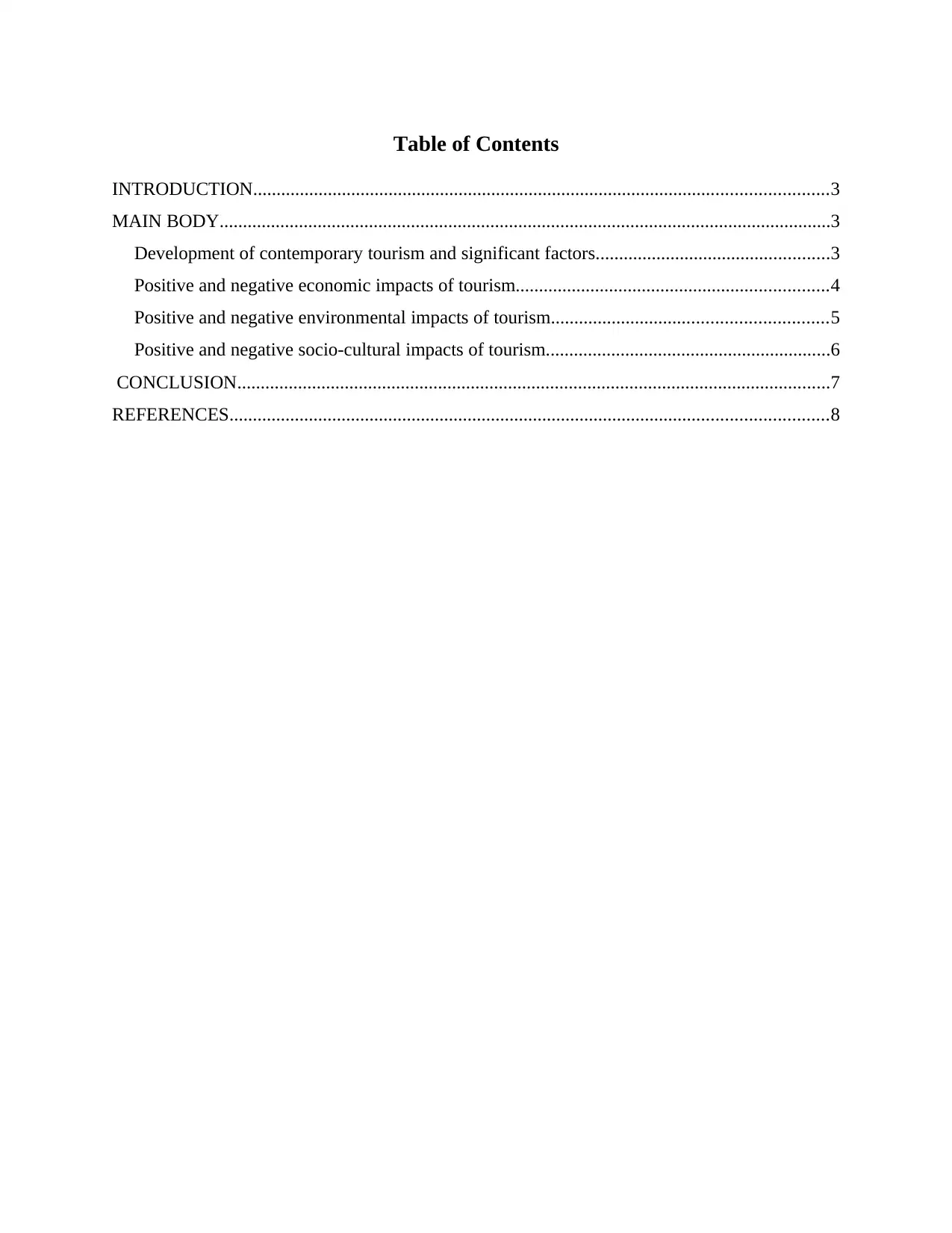
Table of Contents
INTRODUCTION...........................................................................................................................3
MAIN BODY...................................................................................................................................3
Development of contemporary tourism and significant factors..................................................3
Positive and negative economic impacts of tourism...................................................................4
Positive and negative environmental impacts of tourism...........................................................5
Positive and negative socio-cultural impacts of tourism.............................................................6
CONCLUSION...............................................................................................................................7
REFERENCES................................................................................................................................8
INTRODUCTION...........................................................................................................................3
MAIN BODY...................................................................................................................................3
Development of contemporary tourism and significant factors..................................................3
Positive and negative economic impacts of tourism...................................................................4
Positive and negative environmental impacts of tourism...........................................................5
Positive and negative socio-cultural impacts of tourism.............................................................6
CONCLUSION...............................................................................................................................7
REFERENCES................................................................................................................................8
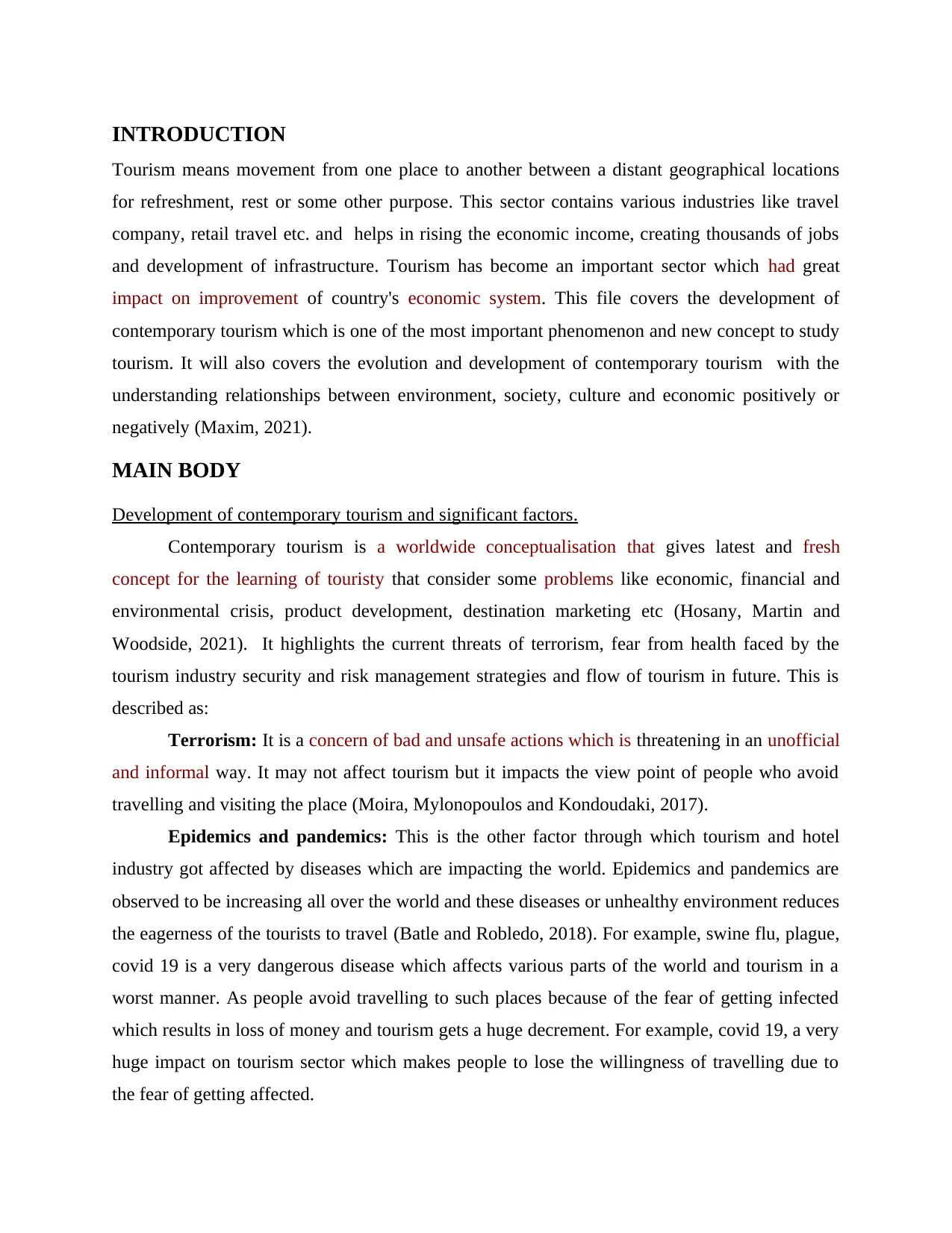
INTRODUCTION
Tourism means movement from one place to another between a distant geographical locations
for refreshment, rest or some other purpose. This sector contains various industries like travel
company, retail travel etc. and helps in rising the economic income, creating thousands of jobs
and development of infrastructure. Tourism has become an important sector which had great
impact on improvement of country's economic system. This file covers the development of
contemporary tourism which is one of the most important phenomenon and new concept to study
tourism. It will also covers the evolution and development of contemporary tourism with the
understanding relationships between environment, society, culture and economic positively or
negatively (Maxim, 2021).
MAIN BODY
Development of contemporary tourism and significant factors.
Contemporary tourism is a worldwide conceptualisation that gives latest and fresh
concept for the learning of touristy that consider some problems like economic, financial and
environmental crisis, product development, destination marketing etc (Hosany, Martin and
Woodside, 2021). It highlights the current threats of terrorism, fear from health faced by the
tourism industry security and risk management strategies and flow of tourism in future. This is
described as:
Terrorism: It is a concern of bad and unsafe actions which is threatening in an unofficial
and informal way. It may not affect tourism but it impacts the view point of people who avoid
travelling and visiting the place (Moira, Mylonopoulos and Kondoudaki, 2017).
Epidemics and pandemics: This is the other factor through which tourism and hotel
industry got affected by diseases which are impacting the world. Epidemics and pandemics are
observed to be increasing all over the world and these diseases or unhealthy environment reduces
the eagerness of the tourists to travel (Batle and Robledo, 2018). For example, swine flu, plague,
covid 19 is a very dangerous disease which affects various parts of the world and tourism in a
worst manner. As people avoid travelling to such places because of the fear of getting infected
which results in loss of money and tourism gets a huge decrement. For example, covid 19, a very
huge impact on tourism sector which makes people to lose the willingness of travelling due to
the fear of getting affected.
Tourism means movement from one place to another between a distant geographical locations
for refreshment, rest or some other purpose. This sector contains various industries like travel
company, retail travel etc. and helps in rising the economic income, creating thousands of jobs
and development of infrastructure. Tourism has become an important sector which had great
impact on improvement of country's economic system. This file covers the development of
contemporary tourism which is one of the most important phenomenon and new concept to study
tourism. It will also covers the evolution and development of contemporary tourism with the
understanding relationships between environment, society, culture and economic positively or
negatively (Maxim, 2021).
MAIN BODY
Development of contemporary tourism and significant factors.
Contemporary tourism is a worldwide conceptualisation that gives latest and fresh
concept for the learning of touristy that consider some problems like economic, financial and
environmental crisis, product development, destination marketing etc (Hosany, Martin and
Woodside, 2021). It highlights the current threats of terrorism, fear from health faced by the
tourism industry security and risk management strategies and flow of tourism in future. This is
described as:
Terrorism: It is a concern of bad and unsafe actions which is threatening in an unofficial
and informal way. It may not affect tourism but it impacts the view point of people who avoid
travelling and visiting the place (Moira, Mylonopoulos and Kondoudaki, 2017).
Epidemics and pandemics: This is the other factor through which tourism and hotel
industry got affected by diseases which are impacting the world. Epidemics and pandemics are
observed to be increasing all over the world and these diseases or unhealthy environment reduces
the eagerness of the tourists to travel (Batle and Robledo, 2018). For example, swine flu, plague,
covid 19 is a very dangerous disease which affects various parts of the world and tourism in a
worst manner. As people avoid travelling to such places because of the fear of getting infected
which results in loss of money and tourism gets a huge decrement. For example, covid 19, a very
huge impact on tourism sector which makes people to lose the willingness of travelling due to
the fear of getting affected.
⊘ This is a preview!⊘
Do you want full access?
Subscribe today to unlock all pages.

Trusted by 1+ million students worldwide
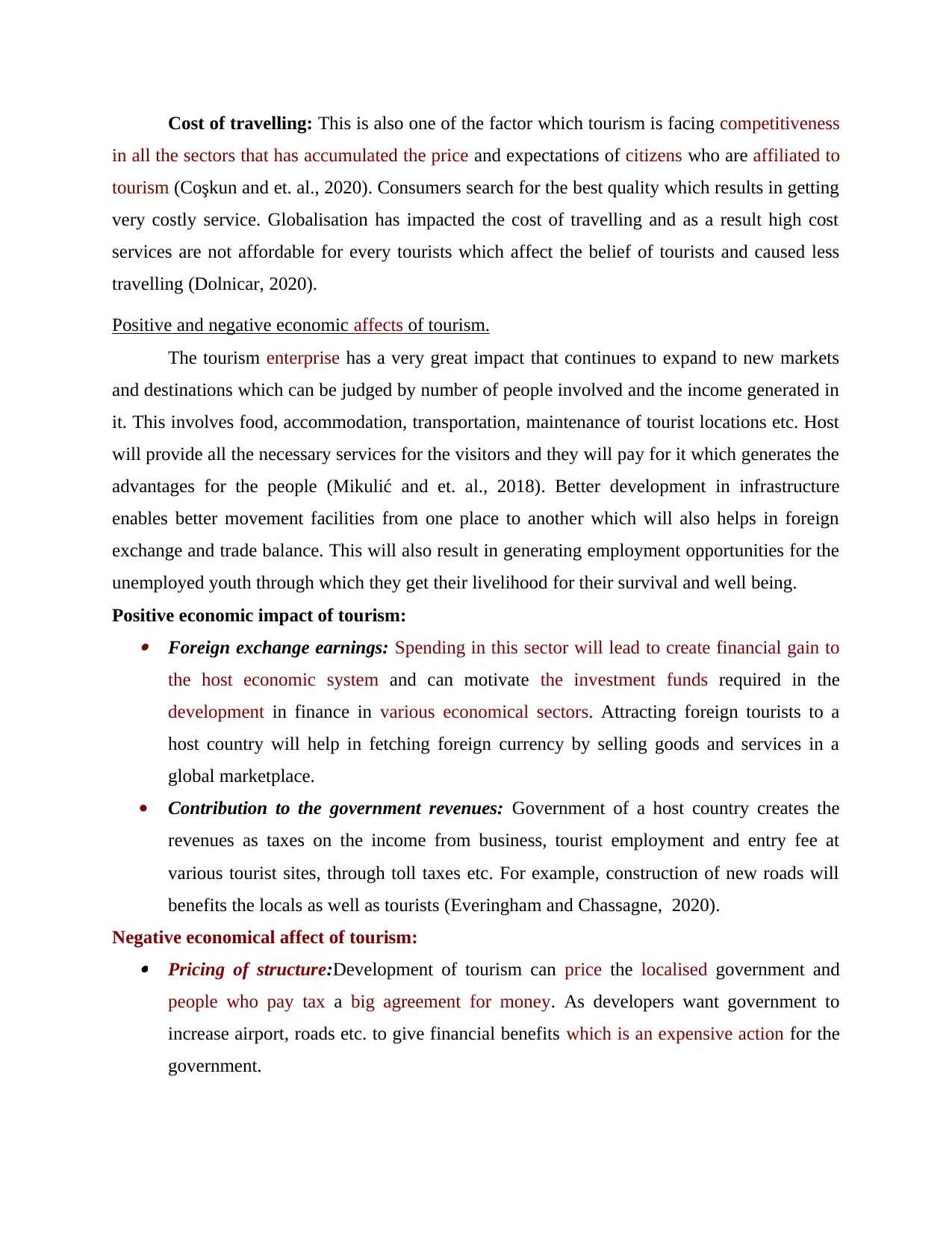
Cost of travelling: This is also one of the factor which tourism is facing competitiveness
in all the sectors that has accumulated the price and expectations of citizens who are affiliated to
tourism (Coşkun and et. al., 2020). Consumers search for the best quality which results in getting
very costly service. Globalisation has impacted the cost of travelling and as a result high cost
services are not affordable for every tourists which affect the belief of tourists and caused less
travelling (Dolnicar, 2020).
Positive and negative economic affects of tourism.
The tourism enterprise has a very great impact that continues to expand to new markets
and destinations which can be judged by number of people involved and the income generated in
it. This involves food, accommodation, transportation, maintenance of tourist locations etc. Host
will provide all the necessary services for the visitors and they will pay for it which generates the
advantages for the people (Mikulić and et. al., 2018). Better development in infrastructure
enables better movement facilities from one place to another which will also helps in foreign
exchange and trade balance. This will also result in generating employment opportunities for the
unemployed youth through which they get their livelihood for their survival and well being.
Positive economic impact of tourism: Foreign exchange earnings: Spending in this sector will lead to create financial gain to
the host economic system and can motivate the investment funds required in the
development in finance in various economical sectors. Attracting foreign tourists to a
host country will help in fetching foreign currency by selling goods and services in a
global marketplace.
Contribution to the government revenues: Government of a host country creates the
revenues as taxes on the income from business, tourist employment and entry fee at
various tourist sites, through toll taxes etc. For example, construction of new roads will
benefits the locals as well as tourists (Everingham and Chassagne, 2020).
Negative economical affect of tourism: Pricing of structure:Development of tourism can price the localised government and
people who pay tax a big agreement for money. As developers want government to
increase airport, roads etc. to give financial benefits which is an expensive action for the
government.
in all the sectors that has accumulated the price and expectations of citizens who are affiliated to
tourism (Coşkun and et. al., 2020). Consumers search for the best quality which results in getting
very costly service. Globalisation has impacted the cost of travelling and as a result high cost
services are not affordable for every tourists which affect the belief of tourists and caused less
travelling (Dolnicar, 2020).
Positive and negative economic affects of tourism.
The tourism enterprise has a very great impact that continues to expand to new markets
and destinations which can be judged by number of people involved and the income generated in
it. This involves food, accommodation, transportation, maintenance of tourist locations etc. Host
will provide all the necessary services for the visitors and they will pay for it which generates the
advantages for the people (Mikulić and et. al., 2018). Better development in infrastructure
enables better movement facilities from one place to another which will also helps in foreign
exchange and trade balance. This will also result in generating employment opportunities for the
unemployed youth through which they get their livelihood for their survival and well being.
Positive economic impact of tourism: Foreign exchange earnings: Spending in this sector will lead to create financial gain to
the host economic system and can motivate the investment funds required in the
development in finance in various economical sectors. Attracting foreign tourists to a
host country will help in fetching foreign currency by selling goods and services in a
global marketplace.
Contribution to the government revenues: Government of a host country creates the
revenues as taxes on the income from business, tourist employment and entry fee at
various tourist sites, through toll taxes etc. For example, construction of new roads will
benefits the locals as well as tourists (Everingham and Chassagne, 2020).
Negative economical affect of tourism: Pricing of structure:Development of tourism can price the localised government and
people who pay tax a big agreement for money. As developers want government to
increase airport, roads etc. to give financial benefits which is an expensive action for the
government.
Paraphrase This Document
Need a fresh take? Get an instant paraphrase of this document with our AI Paraphraser
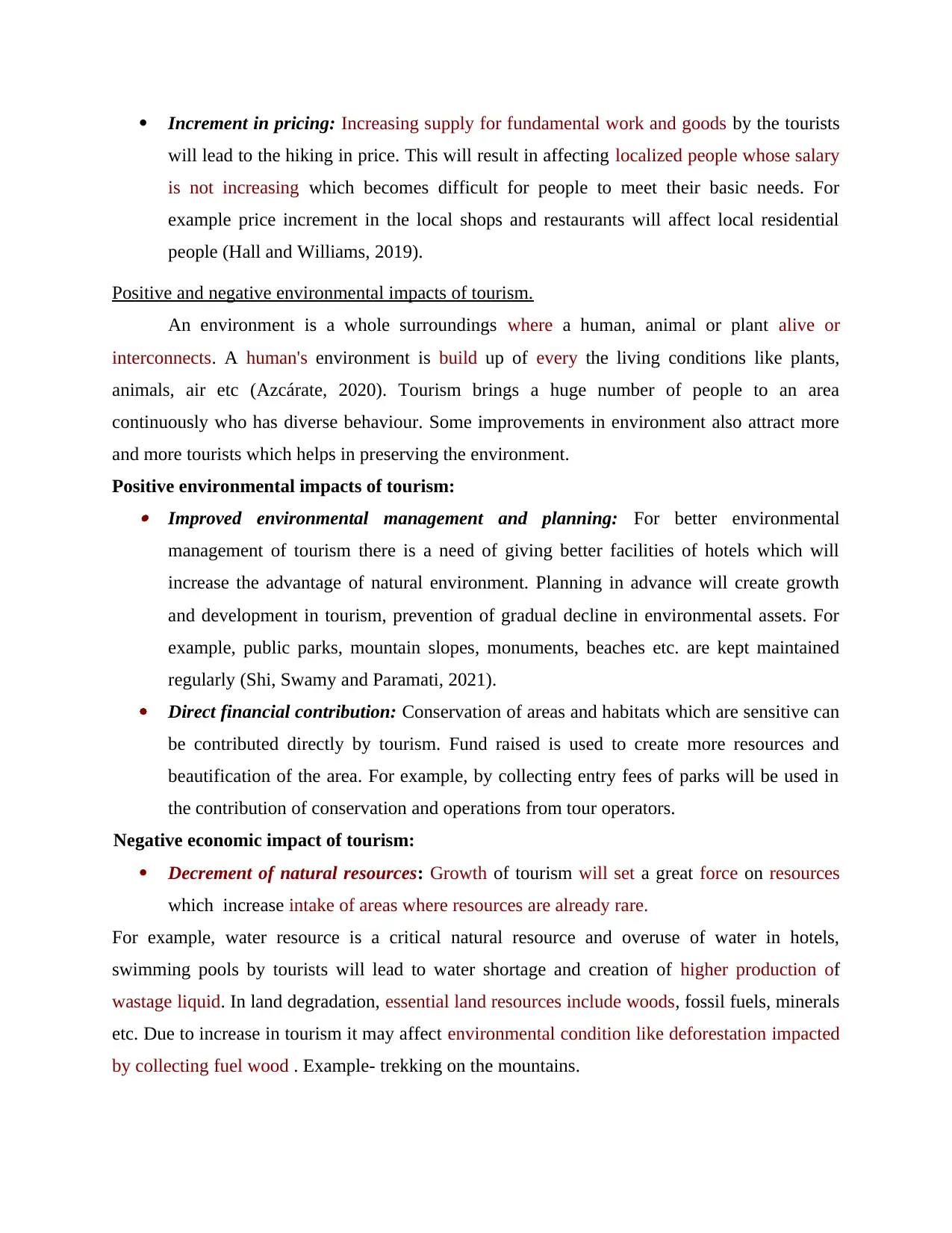
Increment in pricing: Increasing supply for fundamental work and goods by the tourists
will lead to the hiking in price. This will result in affecting localized people whose salary
is not increasing which becomes difficult for people to meet their basic needs. For
example price increment in the local shops and restaurants will affect local residential
people (Hall and Williams, 2019).
Positive and negative environmental impacts of tourism.
An environment is a whole surroundings where a human, animal or plant alive or
interconnects. A human's environment is build up of every the living conditions like plants,
animals, air etc (Azcárate, 2020). Tourism brings a huge number of people to an area
continuously who has diverse behaviour. Some improvements in environment also attract more
and more tourists which helps in preserving the environment.
Positive environmental impacts of tourism: Improved environmental management and planning: For better environmental
management of tourism there is a need of giving better facilities of hotels which will
increase the advantage of natural environment. Planning in advance will create growth
and development in tourism, prevention of gradual decline in environmental assets. For
example, public parks, mountain slopes, monuments, beaches etc. are kept maintained
regularly (Shi, Swamy and Paramati, 2021).
Direct financial contribution: Conservation of areas and habitats which are sensitive can
be contributed directly by tourism. Fund raised is used to create more resources and
beautification of the area. For example, by collecting entry fees of parks will be used in
the contribution of conservation and operations from tour operators.
Negative economic impact of tourism:
Decrement of natural resources: Growth of tourism will set a great force on resources
which increase intake of areas where resources are already rare.
For example, water resource is a critical natural resource and overuse of water in hotels,
swimming pools by tourists will lead to water shortage and creation of higher production of
wastage liquid. In land degradation, essential land resources include woods, fossil fuels, minerals
etc. Due to increase in tourism it may affect environmental condition like deforestation impacted
by collecting fuel wood . Example- trekking on the mountains.
will lead to the hiking in price. This will result in affecting localized people whose salary
is not increasing which becomes difficult for people to meet their basic needs. For
example price increment in the local shops and restaurants will affect local residential
people (Hall and Williams, 2019).
Positive and negative environmental impacts of tourism.
An environment is a whole surroundings where a human, animal or plant alive or
interconnects. A human's environment is build up of every the living conditions like plants,
animals, air etc (Azcárate, 2020). Tourism brings a huge number of people to an area
continuously who has diverse behaviour. Some improvements in environment also attract more
and more tourists which helps in preserving the environment.
Positive environmental impacts of tourism: Improved environmental management and planning: For better environmental
management of tourism there is a need of giving better facilities of hotels which will
increase the advantage of natural environment. Planning in advance will create growth
and development in tourism, prevention of gradual decline in environmental assets. For
example, public parks, mountain slopes, monuments, beaches etc. are kept maintained
regularly (Shi, Swamy and Paramati, 2021).
Direct financial contribution: Conservation of areas and habitats which are sensitive can
be contributed directly by tourism. Fund raised is used to create more resources and
beautification of the area. For example, by collecting entry fees of parks will be used in
the contribution of conservation and operations from tour operators.
Negative economic impact of tourism:
Decrement of natural resources: Growth of tourism will set a great force on resources
which increase intake of areas where resources are already rare.
For example, water resource is a critical natural resource and overuse of water in hotels,
swimming pools by tourists will lead to water shortage and creation of higher production of
wastage liquid. In land degradation, essential land resources include woods, fossil fuels, minerals
etc. Due to increase in tourism it may affect environmental condition like deforestation impacted
by collecting fuel wood . Example- trekking on the mountains.
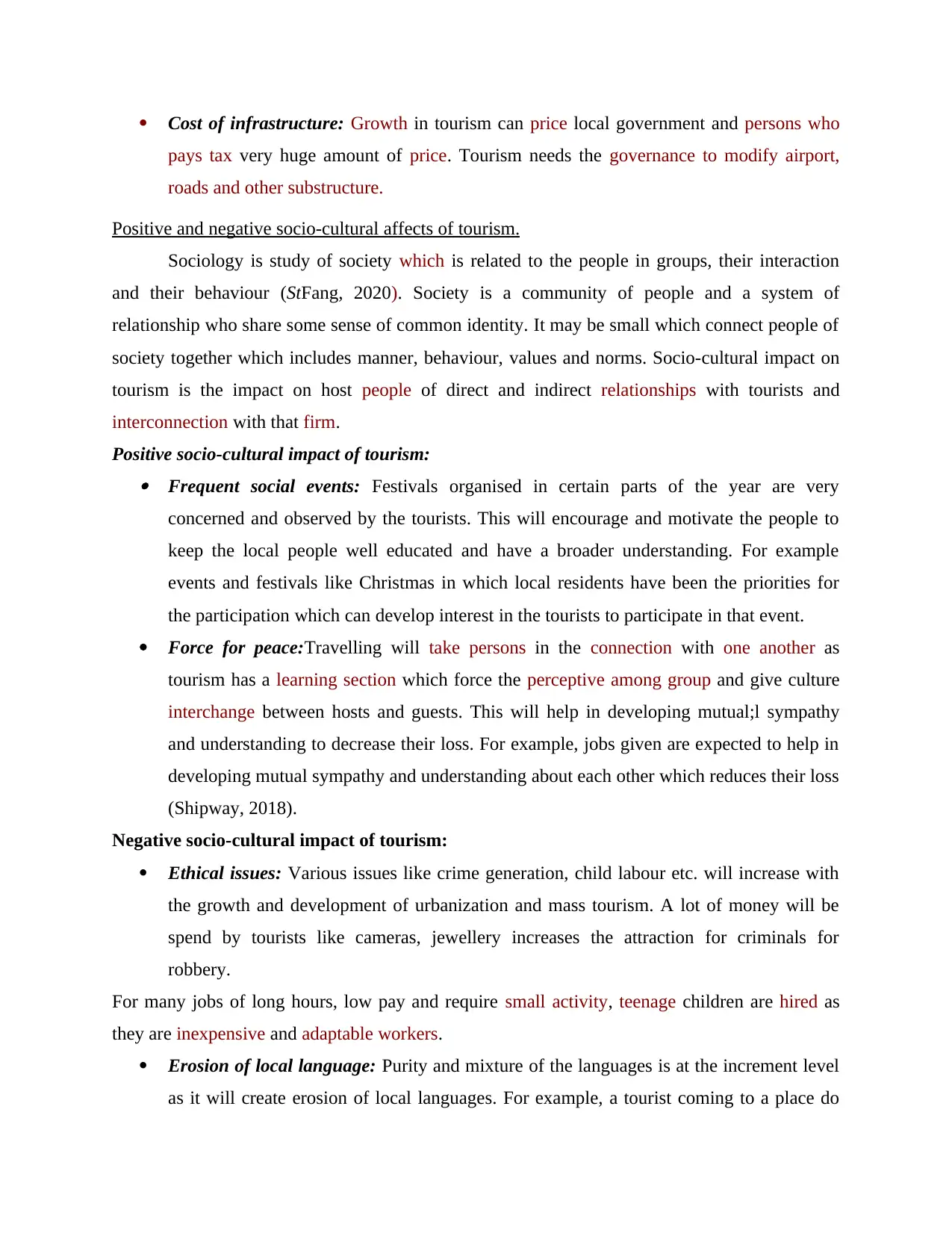
Cost of infrastructure: Growth in tourism can price local government and persons who
pays tax very huge amount of price. Tourism needs the governance to modify airport,
roads and other substructure.
Positive and negative socio-cultural affects of tourism.
Sociology is study of society which is related to the people in groups, their interaction
and their behaviour (StFang, 2020). Society is a community of people and a system of
relationship who share some sense of common identity. It may be small which connect people of
society together which includes manner, behaviour, values and norms. Socio-cultural impact on
tourism is the impact on host people of direct and indirect relationships with tourists and
interconnection with that firm.
Positive socio-cultural impact of tourism: Frequent social events: Festivals organised in certain parts of the year are very
concerned and observed by the tourists. This will encourage and motivate the people to
keep the local people well educated and have a broader understanding. For example
events and festivals like Christmas in which local residents have been the priorities for
the participation which can develop interest in the tourists to participate in that event.
Force for peace:Travelling will take persons in the connection with one another as
tourism has a learning section which force the perceptive among group and give culture
interchange between hosts and guests. This will help in developing mutual;l sympathy
and understanding to decrease their loss. For example, jobs given are expected to help in
developing mutual sympathy and understanding about each other which reduces their loss
(Shipway, 2018).
Negative socio-cultural impact of tourism:
Ethical issues: Various issues like crime generation, child labour etc. will increase with
the growth and development of urbanization and mass tourism. A lot of money will be
spend by tourists like cameras, jewellery increases the attraction for criminals for
robbery.
For many jobs of long hours, low pay and require small activity, teenage children are hired as
they are inexpensive and adaptable workers.
Erosion of local language: Purity and mixture of the languages is at the increment level
as it will create erosion of local languages. For example, a tourist coming to a place do
pays tax very huge amount of price. Tourism needs the governance to modify airport,
roads and other substructure.
Positive and negative socio-cultural affects of tourism.
Sociology is study of society which is related to the people in groups, their interaction
and their behaviour (StFang, 2020). Society is a community of people and a system of
relationship who share some sense of common identity. It may be small which connect people of
society together which includes manner, behaviour, values and norms. Socio-cultural impact on
tourism is the impact on host people of direct and indirect relationships with tourists and
interconnection with that firm.
Positive socio-cultural impact of tourism: Frequent social events: Festivals organised in certain parts of the year are very
concerned and observed by the tourists. This will encourage and motivate the people to
keep the local people well educated and have a broader understanding. For example
events and festivals like Christmas in which local residents have been the priorities for
the participation which can develop interest in the tourists to participate in that event.
Force for peace:Travelling will take persons in the connection with one another as
tourism has a learning section which force the perceptive among group and give culture
interchange between hosts and guests. This will help in developing mutual;l sympathy
and understanding to decrease their loss. For example, jobs given are expected to help in
developing mutual sympathy and understanding about each other which reduces their loss
(Shipway, 2018).
Negative socio-cultural impact of tourism:
Ethical issues: Various issues like crime generation, child labour etc. will increase with
the growth and development of urbanization and mass tourism. A lot of money will be
spend by tourists like cameras, jewellery increases the attraction for criminals for
robbery.
For many jobs of long hours, low pay and require small activity, teenage children are hired as
they are inexpensive and adaptable workers.
Erosion of local language: Purity and mixture of the languages is at the increment level
as it will create erosion of local languages. For example, a tourist coming to a place do
⊘ This is a preview!⊘
Do you want full access?
Subscribe today to unlock all pages.

Trusted by 1+ million students worldwide

not know the local language of people already living at that place (Robledo and Batle,
2017).
2017).
Paraphrase This Document
Need a fresh take? Get an instant paraphrase of this document with our AI Paraphraser
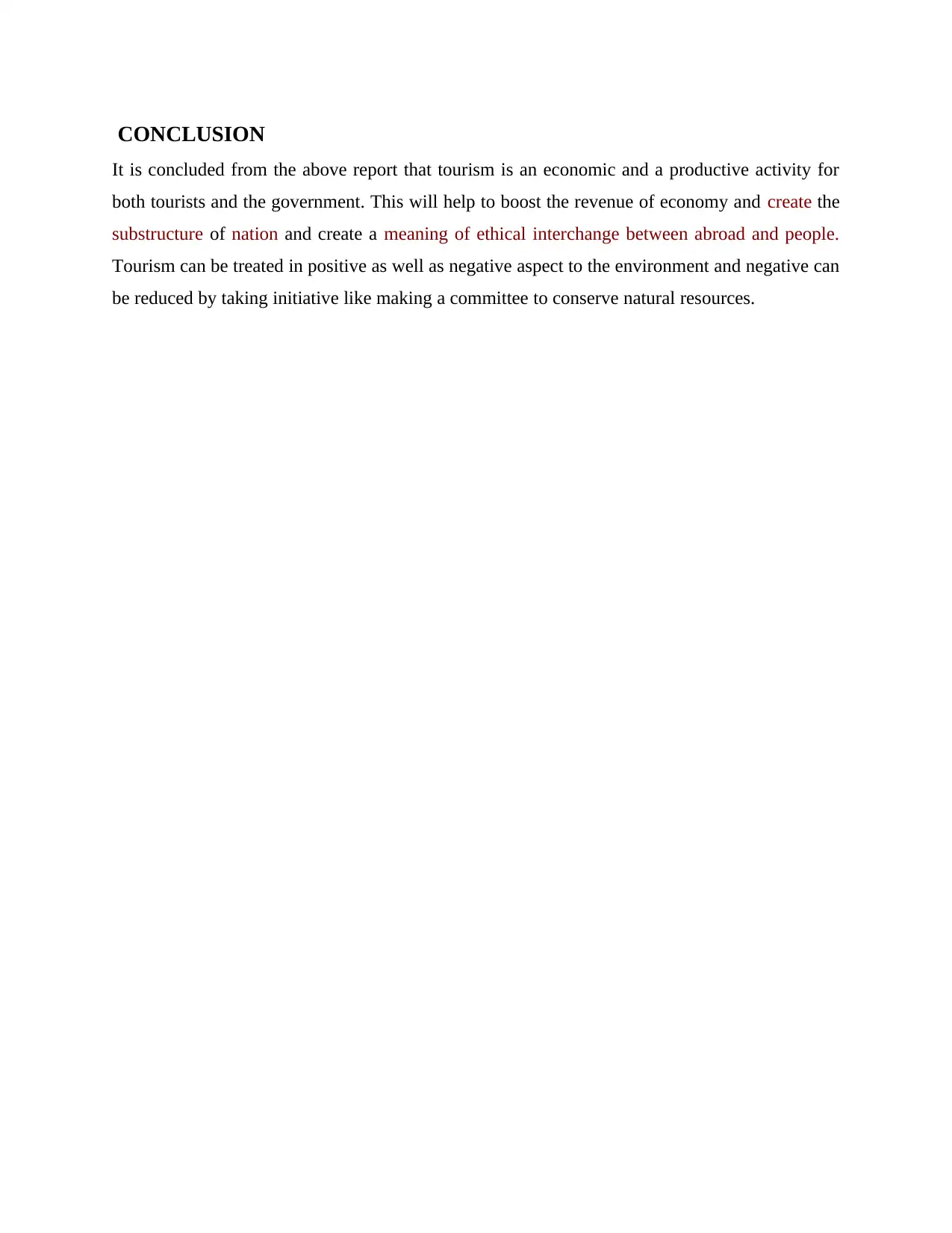
CONCLUSION
It is concluded from the above report that tourism is an economic and a productive activity for
both tourists and the government. This will help to boost the revenue of economy and create the
substructure of nation and create a meaning of ethical interchange between abroad and people.
Tourism can be treated in positive as well as negative aspect to the environment and negative can
be reduced by taking initiative like making a committee to conserve natural resources.
It is concluded from the above report that tourism is an economic and a productive activity for
both tourists and the government. This will help to boost the revenue of economy and create the
substructure of nation and create a meaning of ethical interchange between abroad and people.
Tourism can be treated in positive as well as negative aspect to the environment and negative can
be reduced by taking initiative like making a committee to conserve natural resources.
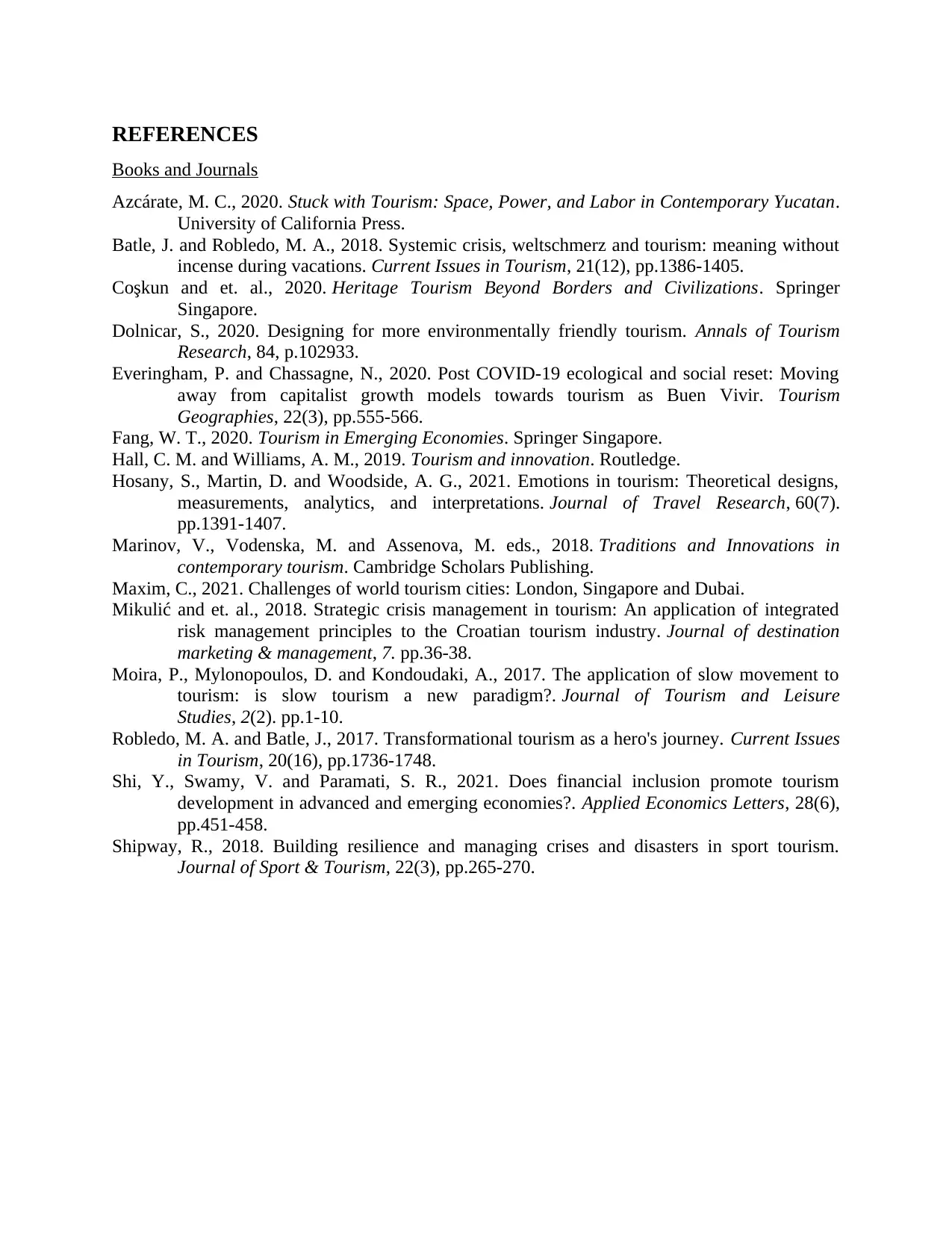
REFERENCES
Books and Journals
Azcárate, M. C., 2020. Stuck with Tourism: Space, Power, and Labor in Contemporary Yucatan.
University of California Press.
Batle, J. and Robledo, M. A., 2018. Systemic crisis, weltschmerz and tourism: meaning without
incense during vacations. Current Issues in Tourism, 21(12), pp.1386-1405.
Coşkun and et. al., 2020. Heritage Tourism Beyond Borders and Civilizations. Springer
Singapore.
Dolnicar, S., 2020. Designing for more environmentally friendly tourism. Annals of Tourism
Research, 84, p.102933.
Everingham, P. and Chassagne, N., 2020. Post COVID-19 ecological and social reset: Moving
away from capitalist growth models towards tourism as Buen Vivir. Tourism
Geographies, 22(3), pp.555-566.
Fang, W. T., 2020. Tourism in Emerging Economies. Springer Singapore.
Hall, C. M. and Williams, A. M., 2019. Tourism and innovation. Routledge.
Hosany, S., Martin, D. and Woodside, A. G., 2021. Emotions in tourism: Theoretical designs,
measurements, analytics, and interpretations. Journal of Travel Research, 60(7).
pp.1391-1407.
Marinov, V., Vodenska, M. and Assenova, M. eds., 2018. Traditions and Innovations in
contemporary tourism. Cambridge Scholars Publishing.
Maxim, C., 2021. Challenges of world tourism cities: London, Singapore and Dubai.
Mikulić and et. al., 2018. Strategic crisis management in tourism: An application of integrated
risk management principles to the Croatian tourism industry. Journal of destination
marketing & management, 7. pp.36-38.
Moira, P., Mylonopoulos, D. and Kondoudaki, A., 2017. The application of slow movement to
tourism: is slow tourism a new paradigm?. Journal of Tourism and Leisure
Studies, 2(2). pp.1-10.
Robledo, M. A. and Batle, J., 2017. Transformational tourism as a hero's journey. Current Issues
in Tourism, 20(16), pp.1736-1748.
Shi, Y., Swamy, V. and Paramati, S. R., 2021. Does financial inclusion promote tourism
development in advanced and emerging economies?. Applied Economics Letters, 28(6),
pp.451-458.
Shipway, R., 2018. Building resilience and managing crises and disasters in sport tourism.
Journal of Sport & Tourism, 22(3), pp.265-270.
Books and Journals
Azcárate, M. C., 2020. Stuck with Tourism: Space, Power, and Labor in Contemporary Yucatan.
University of California Press.
Batle, J. and Robledo, M. A., 2018. Systemic crisis, weltschmerz and tourism: meaning without
incense during vacations. Current Issues in Tourism, 21(12), pp.1386-1405.
Coşkun and et. al., 2020. Heritage Tourism Beyond Borders and Civilizations. Springer
Singapore.
Dolnicar, S., 2020. Designing for more environmentally friendly tourism. Annals of Tourism
Research, 84, p.102933.
Everingham, P. and Chassagne, N., 2020. Post COVID-19 ecological and social reset: Moving
away from capitalist growth models towards tourism as Buen Vivir. Tourism
Geographies, 22(3), pp.555-566.
Fang, W. T., 2020. Tourism in Emerging Economies. Springer Singapore.
Hall, C. M. and Williams, A. M., 2019. Tourism and innovation. Routledge.
Hosany, S., Martin, D. and Woodside, A. G., 2021. Emotions in tourism: Theoretical designs,
measurements, analytics, and interpretations. Journal of Travel Research, 60(7).
pp.1391-1407.
Marinov, V., Vodenska, M. and Assenova, M. eds., 2018. Traditions and Innovations in
contemporary tourism. Cambridge Scholars Publishing.
Maxim, C., 2021. Challenges of world tourism cities: London, Singapore and Dubai.
Mikulić and et. al., 2018. Strategic crisis management in tourism: An application of integrated
risk management principles to the Croatian tourism industry. Journal of destination
marketing & management, 7. pp.36-38.
Moira, P., Mylonopoulos, D. and Kondoudaki, A., 2017. The application of slow movement to
tourism: is slow tourism a new paradigm?. Journal of Tourism and Leisure
Studies, 2(2). pp.1-10.
Robledo, M. A. and Batle, J., 2017. Transformational tourism as a hero's journey. Current Issues
in Tourism, 20(16), pp.1736-1748.
Shi, Y., Swamy, V. and Paramati, S. R., 2021. Does financial inclusion promote tourism
development in advanced and emerging economies?. Applied Economics Letters, 28(6),
pp.451-458.
Shipway, R., 2018. Building resilience and managing crises and disasters in sport tourism.
Journal of Sport & Tourism, 22(3), pp.265-270.
⊘ This is a preview!⊘
Do you want full access?
Subscribe today to unlock all pages.

Trusted by 1+ million students worldwide
1 out of 9
Related Documents
Your All-in-One AI-Powered Toolkit for Academic Success.
+13062052269
info@desklib.com
Available 24*7 on WhatsApp / Email
![[object Object]](/_next/static/media/star-bottom.7253800d.svg)
Unlock your academic potential
Copyright © 2020–2026 A2Z Services. All Rights Reserved. Developed and managed by ZUCOL.



